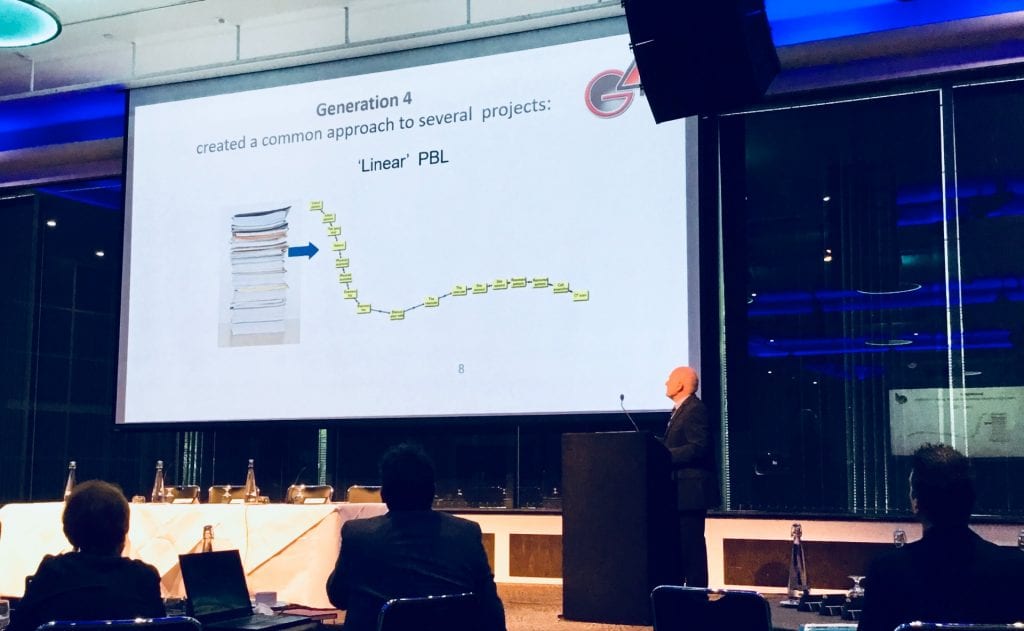Scenario Based Learning Conference, hosted by St. George’s, University of London in October 2018
If you would like to see some of the key presentations, they have been published here, opens in You Tube.
I attended this conference with my ETT colleague Thomas Hanley, as well as a number of academic staff from City’s School of Health Sciences. Firstly we had an introduction from Professor Terry Poulton, Associate Dean for eLearning at St. George’s. He described that the aim of the team working at SGUL was around building a shared, modern educational approach, and transforming medical curricula using interactive Scenario-Based Learning (SBL).

In particular, he described the Waves Network, an EU funded collection of projects linked by Scenario Based Learning which began in 2006, with eViP virtual patients for sharing across Europe, and drove SBL in medical education in Western countries, where institutions were predominantly looking at competency skills for medical students.
This work was followed by projects to create material for decision-making skills and clinical reasoning skills. The Croesus project in collaboration with the Czech Republic and Slovakia was concerned with patient safety, with simulations concerned with understanding and preventing medical errors, Waves stands for widening access to virtual scenarios, team-based learning and simulation.
The first keynote speaker was Dr. James McGee, a practising medic in gastrointestinal and Asst. Dean of Medical Educational Technology from University of Pittsburgh, James is the co-founder of Kynectiv, which developed commercial Virtual Patient software.

He shared an example of an early programme with video clips of a Doctor responding to the choices a student might make, it had a typical branching structure but was quite laborious to script and film. So in developing a software solution, James outlined medical decision making where inputs are clinical data and processing, leading to clinical reasoning, with outputs of diagnosis and therapy, followed by feedback and reflection. Basically it’s how we learn.
The virtual scenario structure still based on a narrative, a good story ties everything together.
Learning from mistakes is very important, interacting with the patient environment is very important.
Dr. McGee quoted Ralph Tyler, where he describes learning as taking place through the action of the student. “It is what he does that he learns, not what the teacher does” (Tyler. 1949)
The next speaker was Sheetal Kavia also from St. George’s University of London, discussing the Waves project, which benefits from EU funding.
Sheetal discussed how the projects combine skills from both academia and business. As partners they share knowledge on authoring, end-user support guidelines, recognising the need for off the shelf products.
They recognised that effective SBL [Scenario Based Learning] has a need for authentic responses and experience consequences of decision making.
Waves project has created a Toolkit of technical and knowledge elements. Incl. authoring systems OL and CASUS. It also has exemplar scenarios, with training videos and user guidelines.
SGUL recently launched a MOOC partnering with Futurelearn, based on a 3 week which is free, and began in October 2018.

Another colleague from SGUL, Trupti Jivram talked briefly about the emphasis on learning through mistakes in decision making.
I liked her quote, “The poorer the choice the students takes, the richer the learning experience’”
Before the break for lunch we heard from the head of Virtual Scenario production at Bayer, Peter Brown.
He outlined the core resources produced by Bayer, a multinational pharmaceutical and life sciences company based in Germany. These are deliverable simulation, team excellence performance simulation, real time simulation, and software simulation. Bayer are looking at AR game simulation & AI but he remains to be convinced of its efficacy.

After the lunch break, I was particularly interested to listen to the 2nd keynote speaker, Prof. Diana Laurillard from UCL Institute of Education’s Knowledge Lab.
Her talk was entitled ‘Co-Designing virtual scenarios for learning’ where she explained in detail her theory-based design for learning, called the ‘Conversational Framework’
Basically asking, what is the learner doing when they are meant to be learning? I like this question and use it a lot in learning spaces development work.
Diana poses a key question, from her Framework: Consider what it takes to encourage iterative processes for learning? And part of that theory of learning design is to design the support for that learning.

She discussed;
1. Contrasting types of digital feedback, with learning through practice along with meaningful intrinsic feedback
2. The use of concealed multiple choice questions, as they can invite guessing and offer no encouragement to reflect on answers
3. Constructionism which doesn’t invite guessing but invites processing
Her final message was of the importance of sharing, exemplars, burden sharing and collaborative knowledge building.
The penultimate speaker was Panos Bamidis, from Aristotle University of Thessaloniki and interestingly, Leeds Medical School.
He referred to research on a Virtual Patients study by Victor Ricklefs, for medical education, specifically OSCE = objective structured clinical examination for medical students. One study of VP cases showed it can closely mimic the behaviour of future doctors in real life situations leading to better retention of interview and practical skills.
The higher the mental load during the PBL VP case the lower the OCSE results, this was interesting but not overly positive!
Finally the last presentation was Andrzej Kononowicz from the international group called Digital Health Education Collaboration. Entitled ‘Does it work?’ Andrzej presented evidence of effectiveness, following comparisons of virtual patient technologies versus traditional methods.
The main skills outcome to highlight was that the pooled effect on skills suggests that virtual patients have moderate to large positive effects in comparison to traditional education in the investigated types of skills. Phew!
The end of the conference was marked by a generous reception on the roof of the hotel venue, see video below St.Pauls movie-shd1u4



